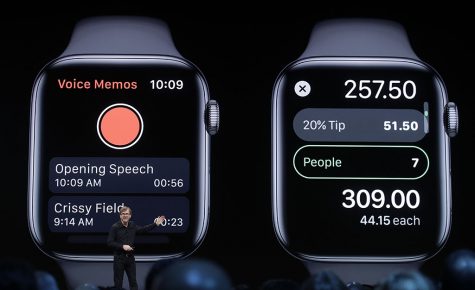Apple to focus on services, update privacy standards
SAN JOSE, Calif. — Apple executives previewed a large set of privacy and speed-focused changes to the company’s phone and computer software Monday, some intended to help it diversify to offset eroding sales of its bedrock product, the iPhone.
Apple’s keynote focused largely on minor feature updates to its flagship software, but hinted at its shift toward a services-focused company.
With plans for expansion on the way, Apple already invested $1 billion to build a new campus in North Austin, among other cities. The 133-acre campus will initially accommodate 5,000 additional employees, with the capacity to grow to 15,000, and is expected to make Apple the largest private employer in Austin.
Although still popular, the iPhone is no longer reliably driving Apple’s profits the way it has for the past decade. Sales have fallen sharply for the past two quarters, and could suffer another blow if China’s government targets the iPhone in retaliation for the trade war being waged by President Donald Trump.
Apple emphasized its privacy protections during the keynote — following along with Facebook, Google and other major tech companies’ scripts this year.
Sign of the times. Apple making it so corporations can’t get your email in exchange for sign-ins gets biggest applause of the day. #wwdc2019 pic.twitter.com/XuLdQeg1dh
— Mike Daisey (@mdaisey) June 3, 2019
In its new operating system iOS 13, the company is introducing “Sign in with Apple” to let users sign into apps without using similar sign-in services from Facebook and Google. The sign in will let you hide your actual email address if you choose. Apple is also making it easier to only show your location to apps once and not continually.
Another potential problem looms for Apple. Regulatory complaints and a consumer lawsuit both question whether Apple has been abusing the power of its iPhone app store to thwart competition and gouge smaller technology companies that rely on it to attract users and sell their services.
Apple is trying to adapt by squeezing money from digital services tailored for the more than 900 million iPhones currently in use.
Of course, the company hasn’t totally abandoned the iPhone. The newest version of Apple’s iPhone operating system, iOS 13, will feature a dark mode and faster tools. For instance, the company said a new version of its Face ID system will unlock your phone 30 percent faster.
The biggest remake of a single app is a makeover of Apple Maps, which will debut this fall. It includes more granular street and place data that Apple says it collected with street and aerial footage — tactics its largest mobile app rival Google has been using for years.

Apple’s Kevin Lynch talks about the Apple Watch at the Apple Worldwide Developers Conference in San Jose, California, Monday.
Apple also unveiled several new apps for its smartwatch, including independent apps that don’t rely on the iPhone. The App Store will be available on the watch, making it possible for people to find and download apps right on their watch — expanding the availability of purchases that generate commissions for Apple.
In its laptop and desktop businesses, Apple is breaking up its iTunes software for computers into three apps: Apple Music, Apple Podcasts and Apple TV. Apple debuted iTunes 16 years ago to sell and manage digital music for the iPod, which paved the way for the iPhone. Apple added 6,000 jobs to its American workforce in 2018 and now employs 90,000 people in all 50 states.












